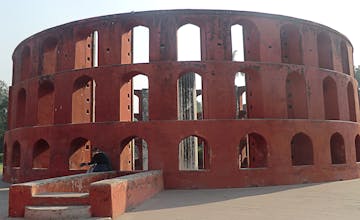
This course presents some important vignettes of a complex, highly diverse India that is also witnessing unprecedented changes since its formal independence in 1947 from Great Britain. The lectures revolve around social dimensions of change, the continuing...
Read more
Two deals to help you save
Good to know
Save this course
Reviews summary
In-depth examination of modern india
Activities
Watch videos on Indian classical dance
Show steps
Provides an introduction to the different styles of Indian classical dance.
Show steps
-
Find videos on platforms like YouTube
-
Watch videos and learn about the history, techniques, and different styles
Solve Indian constitution quizzes
Show steps
Improves understanding of the structure and principles of the Indian constitution.
Show steps
-
Find online quizzes or practice tests
-
Take quizzes and review results
Read The Argumentative Indian by Amartya Sen
Show steps
Offers insights into the role of critical thinking and debate in Indian society.
View
Home in the World
on Amazon
Show steps
-
Read each chapter
-
Discuss key arguments with peers
-
Apply ideas to contemporary issues
Three other activities
Expand to see all activities and additional details
Show all six activities
Create a timeline of Indian independence
Show steps
Helps visualize and understand the major events leading to and following India's independence.
Show steps
-
Research key events
-
Create a timeline using a tool like TimelineJS
-
Share timeline with peers for feedback
Attend a workshop on Indian cinema
Show steps
Provides insights into the history, evolution, and cultural impact of Indian cinema.
Show steps
-
Find local workshops or online events
-
Attend workshop and participate in discussions
Volunteer at a local NGO working on social issues
Show steps
Provides practical experience in addressing social issues discussed in the course.
Browse courses on
Social Change
Show steps
-
Find local NGOs
-
Contact organization and inquire about volunteering opportunities
-
Participate in volunteer activities
Watch videos on Indian classical dance
Show steps
Provides an introduction to the different styles of Indian classical dance.
Show steps
- Find videos on platforms like YouTube
- Watch videos and learn about the history, techniques, and different styles
Solve Indian constitution quizzes
Show steps
Improves understanding of the structure and principles of the Indian constitution.
Show steps
- Find online quizzes or practice tests
- Take quizzes and review results
Read The Argumentative Indian by Amartya Sen
Show steps
Offers insights into the role of critical thinking and debate in Indian society.
View
Home in the World
on Amazon
Show steps
- Read each chapter
- Discuss key arguments with peers
- Apply ideas to contemporary issues
Create a timeline of Indian independence
Show steps
Helps visualize and understand the major events leading to and following India's independence.
Show steps
- Research key events
- Create a timeline using a tool like TimelineJS
- Share timeline with peers for feedback
Attend a workshop on Indian cinema
Show steps
Provides insights into the history, evolution, and cultural impact of Indian cinema.
Show steps
- Find local workshops or online events
- Attend workshop and participate in discussions
Volunteer at a local NGO working on social issues
Show steps
Provides practical experience in addressing social issues discussed in the course.
Browse courses on
Social Change
Show steps
- Find local NGOs
- Contact organization and inquire about volunteering opportunities
- Participate in volunteer activities
Career center
Historian
Economist
Sociologist
Political Scientist
Anthropologist
Social Worker
Human Resources Manager
Teacher
Lawyer
Journalist
Business Development Manager
Management Consultant
Marketing Manager
Financial Analyst
Public Relations Specialist
Reading list
Share
Similar courses
OpenCourser helps millions of learners each year. People visit us to learn workspace skills, ace their exams, and nurture their curiosity.
Our extensive catalog contains over 50,000 courses and twice as many books. Browse by search, by topic, or even by career interests. We'll match you to the right resources quickly.
Find this site helpful? Tell a friend about us.
We're supported by our community of learners. When you purchase or subscribe to courses and programs or purchase books, we may earn a commission from our partners.
Your purchases help us maintain our catalog and keep our servers humming without ads.
Thank you for supporting OpenCourser.


